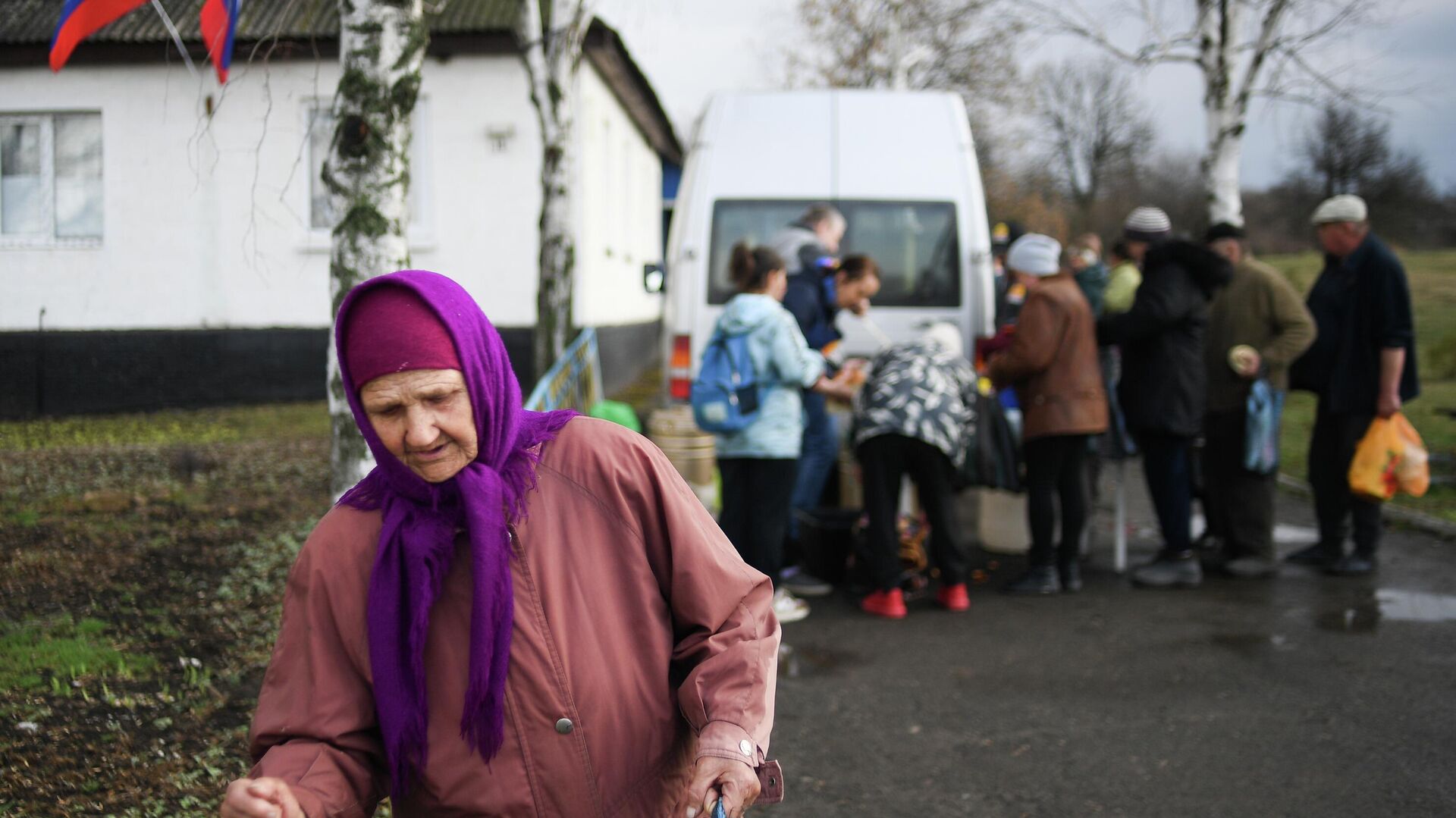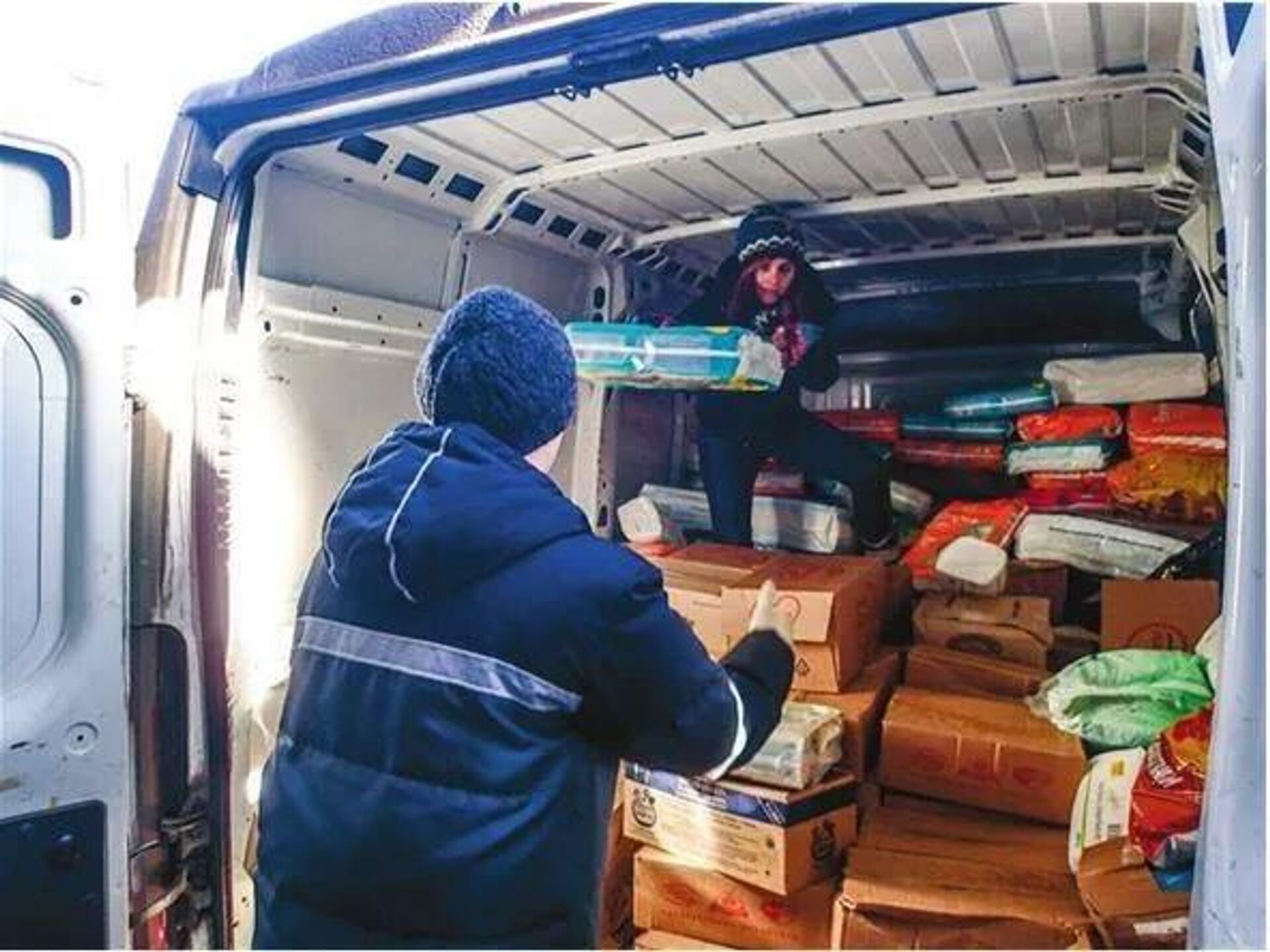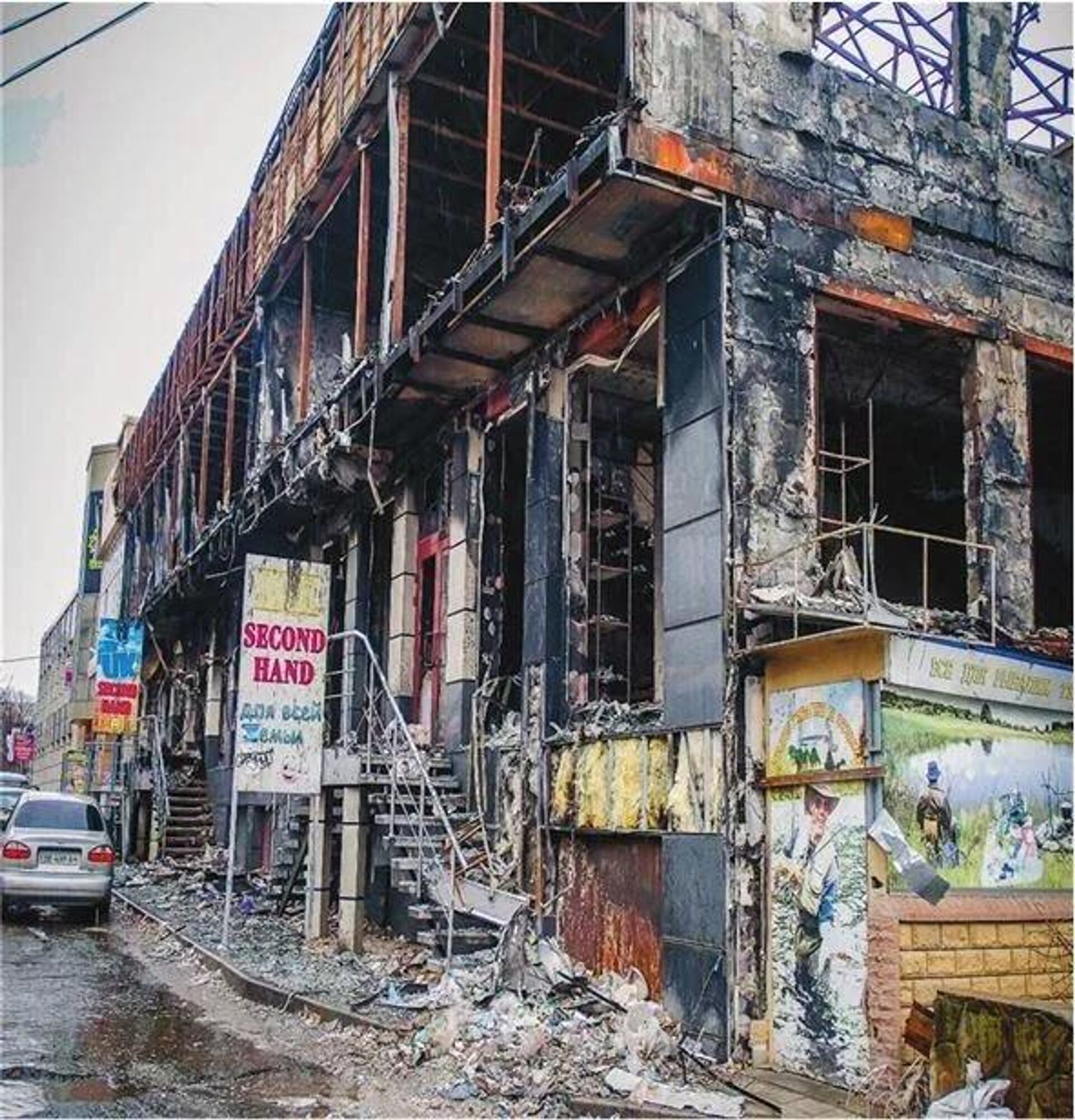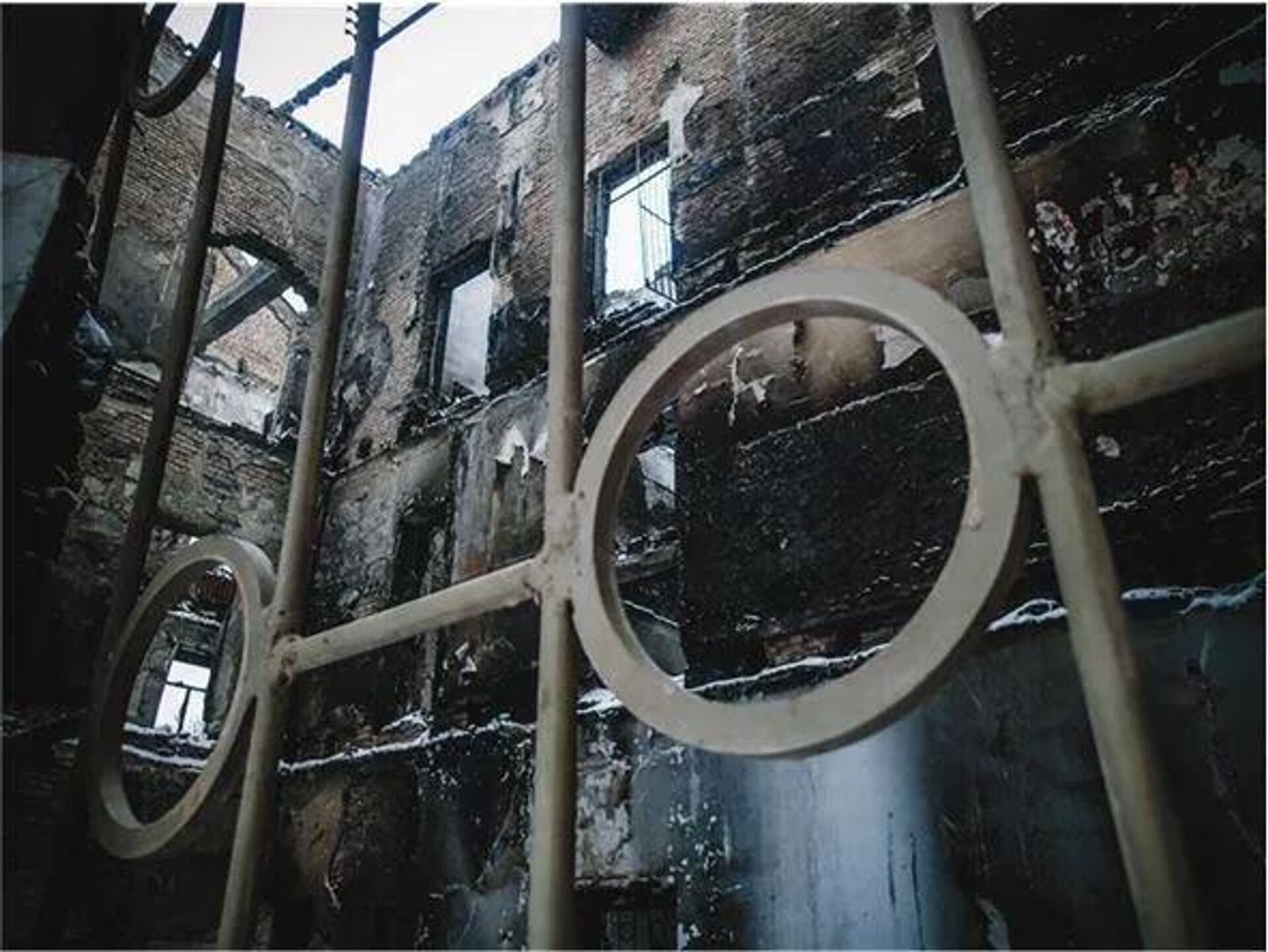https://sputnikglobe.com/20220411/i-am-in-lugansk-part-three-the-diary-of-volunteer-evdokiya-sheremeteva-1094637078.html
‘I Am in Lugansk’. Part Three. The Diary of Volunteer Evdokiya Sheremeteva.
‘I Am in Lugansk’. Part Three. The Diary of Volunteer Evdokiya Sheremeteva.
Sputnik International
We continue to publish fragments from a heart-rending and sometimes unbearably honest book. This is a diary by journalist and volunteer Evdokiya Sheremeteva... 11.04.2022, Sputnik International
2022-04-11T05:01+0000
2022-04-11T05:01+0000
2022-08-06T12:10+0000
ukraine
donbass
donbass. genocide. 2014-2022
diary of volunteer evdokiya sheremeteva
https://cdn1.img.sputnikglobe.com/img/07e6/04/0a/1094642721_0:191:2962:1857_1920x0_80_0_0_4232535887a5e2dbbece1d4b02145555.jpg
...We were walking through a dark park, the lanterns illuminated. The tiled paths outlined with white snow streaks.The day before, I read a post about Pervomaisk, about starving children, about the inhumane conditions of this town, which has been under heavy artillery fire for half a year.I reposted the message and kept on waiting for someone to respond and pass on the contacts.But nobody responded.There was a deafening silence in the park, my daughter running around. And I thought children in Pervomaisk couldn't do that. Because they sit in bomb shelters and are afraid to go outside.The same girls and boys, just like my daughter.A snow fortress nearby and coloured lanterns illuminating it. My daughter ran up to one of them and started covering the light with her hand.– Mummy, look: my face is green!Her green face glowed with happiness, the park was like a snowy Narnia at night, as if we got there through a wardrobe in a big old house.But you can try to do everything yourself, right?– Serezha, I've been thinking, do you think we could collect some food and things and deliver them ourselves?– Yes, let's do it.Sasha of Gurzuf and LyoshaThe plan was to collect aid and give it to someone who would take it to Lugansk. I started frantically calling journalists I knew, but everyone was just brushing me off. All of a sudden, Sasha wrote to me. Another Sasha in my life.This Sasha was from Gurzuf, the same place where I used to pluck alycha trees. He attended the same school as a close friend of mine and read my LiveJournal:– Dunya, why don't we rent a van and take whatever you collect? I'll pay for the car.At this point, I had three bags with my daughter's clothes, medicine, and I was planning to buy buckwheat and stew with the royalties from my last articles.And that was it. Next a GAZelle vehicle? Perhaps, maybe someone will bring something more.“Guys, anyway, I'm going by myself, if you want to get in on the action, DM me. I'm going this weekend”.A few hours later, personal messages started pouring in.The same evening, the house was flooded with food and things. People started bringing in money. Within a few days, we had collected around 100,000 rubles. Out of nowhere, Lyosha appeared and offered to help collect and buy food, allocating a considerable amount of money for this purpose. He turned out to be a friend of a friend.CustomsA day later, Sasha of Gurzuf and I were standing at the border between the LPR and Russia. We did not know each other at all, but it seemed like it was how it should be. We did not understand that we were going into a war zone, that we could be killed at any moment. That it was dangerous.‘Tears of Lugansk’22 December 2014DiaryWe did almost the impossible. In less than a week we packed a GAZelle full of food and things. And this weekend Sasha and I took them to Lugansk, from where my friend Zhenya delivered everything to Pervomaisk today. Those willing to help still write, and there's likely to be another car on the way. So, apparently, I will go there next weekend as well. I will write about humanitarian aid separately, I will surely do that. Guys, friends, brothers, sisters, and relatives, I thank everyone who sent money, who brought warm baby jumpers and baby formula. Thank you to all those who, without knowing me personally, believed.You can read someone's story millions of times. You can watch and watch videos on YouTube, but simply believe that this is not the case. I knew it all. But when you see it with your own eyes, reality changes. The world has changed and it would never be the same for me.My experience of the war started this very night. A huge, deserted road, perfectly paved for the European Football Championship.But somewhere in Chernobyl.Perfect asphalt, deep holes, collapsed bridges and tanks along the road.Pitch-dark night, you drive slowly because there are huge shell craters in the middle of the road, and sometimes shell splinters. Somewhere, there's just a tank standing there...– You always have to drive a slalom here.Zhenya laughs. And there is nobody around. Void and blackness that starts to consume me.In the morning, we went to Novosvetlovka, or rather what was left of it.As I was taking pictures, a woman was passing by. Irina, a tall blonde woman, sent all her children and grandchildren to Russia.– Why don't you leave yourself?– Where to? Who needs me? This is my home.– Were you here when they bombed?– We were.A middle-aged man in a padded jacket is standing next to her.– Then the Aidiar Battalion fighters drove the people into the church and looted the houses and flats. It was terrible what was going on. They sat there all day and into the night. There were shooting rounds at the church.– How many people died?– Hard to say.– Father, do you need a ride?An old man in huge boots is standing on the road, waiting for a shuttle bus.– A holiday event?Sits down and talks non-stop.– From a funeral. Buried my niece.– Why aren't you leaving?– Why should I leave? This is my home.– It's not safe, why take the risk?– You can't escape your fate...And looks at me puzzled.– And your children, your wife?– They are in Kiev.Sighing, he continues:– I tell my friends, relatives that I am here, but they do not believe me. They say I am lying. My own relatives don't believe me! No one in the world believes us at all. Do you understand? No one! We are being slaughtered with Grad missiles and mortars, killed, looted, and no one from that side believes us. No one! We're shooting and bombing ourselves!His voice is breaking, trembling. I can see it out of the corner of my eye: he is near tears. I turn to look away.Part One: ‘My War’Part Two: 'Hunger in Lugansk'Part Four: ‘Tears of Lugansk’
ukraine
donbass
Sputnik International
feedback@sputniknews.com
+74956456601
MIA „Rossiya Segodnya“
2022
Sputnik International
feedback@sputniknews.com
+74956456601
MIA „Rossiya Segodnya“
News
en_EN
Sputnik International
feedback@sputniknews.com
+74956456601
MIA „Rossiya Segodnya“
Sputnik International
feedback@sputniknews.com
+74956456601
MIA „Rossiya Segodnya“
ukraine, donbass, diary of volunteer evdokiya sheremeteva
ukraine, donbass, diary of volunteer evdokiya sheremeteva
‘I Am in Lugansk’. Part Three. The Diary of Volunteer Evdokiya Sheremeteva.
05:01 GMT 11.04.2022 (Updated: 12:10 GMT 06.08.2022) We continue to publish fragments from a heart-rending and sometimes unbearably honest book. This is a diary by journalist and volunteer Evdokiya Sheremeteva, who throughout the eight years of the war brought humanitarian aid to Donbass, rescued the sick and the wounded, and collected ruthless evidence of the truth.
...We were walking through a dark park, the lanterns illuminated. The tiled paths outlined with white snow streaks.
The day before, I read a post about Pervomaisk, about starving children, about the inhumane conditions of this town, which has been under heavy artillery fire for half a year.
I reposted the message and kept on waiting for someone to respond and pass on the contacts.
There was a deafening silence in the park, my daughter running around. And I thought children in Pervomaisk couldn't do that. Because they sit in bomb shelters and are afraid to go outside.
The same girls and boys, just like my daughter.
A snow fortress nearby and coloured lanterns illuminating it. My daughter ran up to one of them and started covering the light with her hand.
– Mummy, look: my face is green!
Her green face glowed with happiness, the park was like a snowy Narnia at night, as if we got there through a wardrobe in a big old house.
But you can try to do everything yourself, right?
– Serezha, I've been thinking, do you think we could collect some food and things and deliver them ourselves?
Sasha of Gurzuf and Lyosha
The plan was to collect aid and give it to someone who would take it to Lugansk. I started frantically calling journalists I knew, but everyone was just brushing me off. All of a sudden, Sasha wrote to me. Another Sasha in my life.
This Sasha was from Gurzuf, the same place where I used to pluck alycha trees. He attended the same school as a close friend of mine and read my LiveJournal:
– Dunya, why don't we rent a van and take whatever you collect? I'll pay for the car.
At this point, I had three bags with my daughter's clothes, medicine, and I was planning to buy buckwheat and stew with the royalties from my last articles.
And that was it. Next a GAZelle vehicle? Perhaps, maybe someone will bring something more.
“Guys, anyway, I'm going by myself, if you want to get in on the action, DM me. I'm going this weekend”.
A few hours later, personal messages started pouring in.
The same evening, the house was flooded with food and things. People started bringing in money. Within a few days, we had collected around 100,000 rubles. Out of nowhere, Lyosha appeared and offered to help collect and buy food, allocating a considerable amount of money for this purpose. He turned out to be a friend of a friend.
A day later, Sasha of Gurzuf and I were standing at the border between the LPR and Russia. We did not know each other at all, but it seemed like it was how it should be. We did not understand that we were going into a war zone, that we could be killed at any moment. That it was dangerous.
‘Tears of Lugansk’
22 December 2014
Diary
We did almost the impossible. In less than a week we packed a GAZelle full of food and things. And this weekend Sasha and I took them to Lugansk, from where my friend Zhenya delivered everything to Pervomaisk today. Those willing to help still write, and there's likely to be another car on the way. So, apparently, I will go there next weekend as well. I will write about humanitarian aid separately, I will surely do that. Guys, friends, brothers, sisters, and relatives, I thank everyone who sent money, who brought warm baby jumpers and baby formula. Thank you to all those who, without knowing me personally, believed.
You can read someone's story millions of times. You can watch and watch videos on YouTube, but simply believe that this is not the case. I knew it all. But when you see it with your own eyes, reality changes. The world has changed and it would never be the same for me.
My experience of the war started this very night. A huge, deserted road, perfectly paved for the European Football Championship.
But somewhere in Chernobyl.
Perfect asphalt, deep holes, collapsed bridges and tanks along the road.
Pitch-dark night, you drive slowly because there are huge shell craters in the middle of the road, and sometimes shell splinters. Somewhere, there's just a tank standing there...
– You always have to drive a slalom here.
Zhenya laughs. And there is nobody around. Void and blackness that starts to consume me.
In the morning, we went to Novosvetlovka, or rather what was left of it.
As I was taking pictures, a woman was passing by. Irina, a tall blonde woman, sent all her children and grandchildren to Russia.
– Why don't you leave yourself?
– Where to? Who needs me? This is my home.
– Were you here when they bombed?
A middle-aged man in a padded jacket is standing next to her.
– Then the Aidiar Battalion fighters drove the people into the church and looted the houses and flats. It was terrible what was going on. They sat there all day and into the night. There were shooting rounds at the church.
– Father, do you need a ride?
An old man in huge boots is standing on the road, waiting for a shuttle bus.
Sits down and talks non-stop.
– From a funeral. Buried my niece.
– Why aren't you leaving?
– Why should I leave? This is my home.
– It's not safe, why take the risk?
– You can't escape your fate...
– And your children, your wife?
– I tell my friends, relatives that I am here, but they do not believe me. They say I am lying. My own relatives don't believe me! No one in the world believes us at all. Do you understand? No one! We are being slaughtered with Grad missiles and mortars, killed, looted, and no one from that side believes us. No one! We're shooting and bombing ourselves!
His voice is breaking, trembling. I can see it out of the corner of my eye: he is near tears. I turn to look away.





